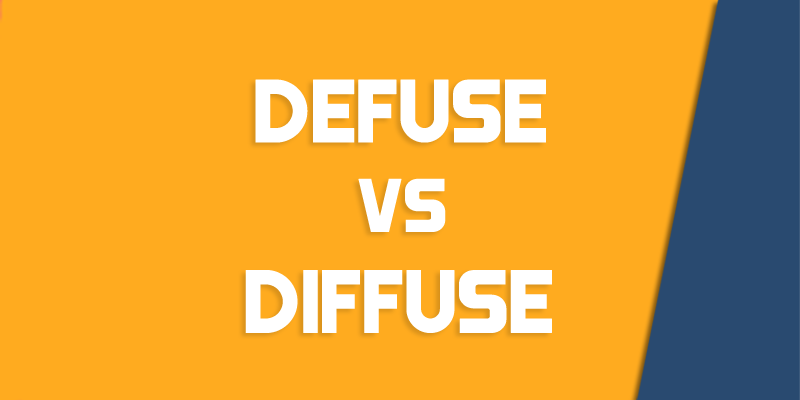Defuse vs. Diffuse – What’s the Gist?
Both these English words have a similar base word of fuse; however, it is the respective prefixes that make the distinctions in their meanings. The prefix de- means to do the opposite of or the reverse. The Latin prefix dis-, which over time morphed into dif-, means away.
To defuse, then, is to do the opposite as in removing the fuse or to reverse the harm. To diffuse is to pour away or scatter.
By the way, the reason the ending letters in Latin prefixes sometimes change is because two contiguous consonants sometimes make the word more challenging to pronounce. In other words, it would be more difficult to pronounce the word diffuse as disfuse rather than diffuse. The modification allows the two consonants to blend better together.
- Defuse is a transitive verb, meaning to remove the fuse or to make less harmful.
- Diffuse is an adjective, meaning to scatter; or as a verb to pour out.

How to Use Defuse in a Sentence
Defuse definition: Because defuse is a transitive verb, it has a direct object to receive the action. Someone is defusing something—either an ordnance or a situation.
For example:
- The EOD specialist defused the forgotten WWII mine found in the bay. (Past Tense Verb)
- After specialized training, the Army soldier will be able to defuse bombs. (Infinitive)
- The host of the party tried to defuse the rising tensions among family members by suggesting that they play a game. (Infinitive)
Defuse (pronounced \dif yüz\) in either context suggests the restoration of peace after a crisis of some type.
How to Use Diffuse in a Sentence
Diffuse definition: In its adjectival form, diffuse means not concentrated or localized; or being disorderly verbose. For the verb, diffuse means to cause something to be spread freely, or to break up and distribute. In fact, the Latin base fundere means to pour.
For example:
- During their house renovation, the couple looked for diffuse overhead lighting to place in their dining room. (Adjective)
- The diffuse child excitedly talked to her mother about the birthday party. (Adjective)
- She diffused essential oils to add aromatic ambiance to the room. (Past Tense Verb)
Furthermore, as an adjective diffuse is pronounced \dif yüs\, taking the es sound. As a verb, it is pronounced as you think it is \dif yüz\, keeping the zee sound.
Outside Examples of Defuse vs. Diffuse
- More than 50,000 people were forced to evacuate the Italian city of Brindisi on Sunday as experts worked to defuse a World War II bomb, officials said. –New York Post
- Senate Republicans quickly seized on House Judiciary Chairman Jerry Nadler’s “cover-up” comments Wednesday, saying the controversial remarks — which prompted a rare rebuke from Chief Justice John Roberts — were a significant misstep that undermined House Democrats’ case against Trump. Democrats tried to defuse the situation, pointing out that Roberts admonished Trump’s legal team as well, not just Nadler. –Politico
- Opposition to the proposal prompted the church to issue a June 24 statement on its website and Facebook page in an effort to “diffuse confusion and assuage concern.” The church statement stressed the proposed plant would not discharge sewage into the Gunpowder River or mistreat the environment. –The Baltimore Sun
- There’s a fine line between the two types of curtains. Room-darkening curtains diffuse light by letting a bit to pass through the fabric. Blackout curtains are designed with opaque fabric to make a room remain pitch-black without any light passing through the fabric. –Chicago Tribune
Phrases That Use Defuse and Diffuse
There are some phrases that use the word defuse or diffuse, including:
Defuse something: Trying to remove a fuse from a bomb or calm a tense situation.
- The reporter proffered a joke, trying to defuse the gathering protestors.
Diffuse through something: A conduit used to cause something to permeate or spread freely.
- The essential oils were diffused through a diffuser.
How to Remember These Words
While these words have the same four closing letters, they are not synonyms and are not interchangeable.
- Defuse is to make less harmful.
- Diffuse is to scatter or spread.
One way to remember to use the word defuse is by looking at the first three letters. They are the same in the word definitely. And you would definitely want to defuse a bomb or an argument since both can be explosive.
A mnemonic device for diffuse is to remember the first four letters are shared with the word different. When you diffuse essential oils in the air, the room smells different.
For example:
- The city was definitely relieved when the WWII mine was defused.
- The city was definitely relieved when the demonstration was defused.
- The room smelled different when mom diffused the essential oils.
Article Summary
Is defuse or diffuse correct? While it’s true that defuse and diffuse share the same pronunciation when diffuse is a verb, it does depend upon what you want to do. If you are looking to calm a situation, choose to defuse. If you want to scatter or pour out, try to diffuse.
And with essential oils gaining in popularity, you might be looking for the word diffuse.
- Defuse is a transitive verb.
- Diffuse is an adjective pronounced \dif yüs\ or a verb pronounced \dif yüz\.
